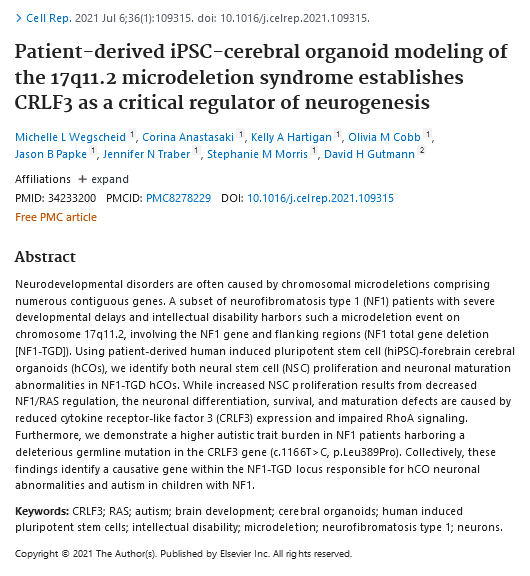26.11.2021
Patient-derived iPSC-cerebral organoid modeling of the 17q11.2 microdeletion syndrome establishes CRLF3 as a critical regulator of neurogenesis
Cell Reports, 2021
Abstract
Neurodevelopmental disorders are often caused by chromosomal microdeletions comprising numerous contiguous genes. A subset of neurofibromatosis type 1 (NF1) patients with severe developmental delays and intellectual disability harbors such a microdeletion event on chromosome 17q11.2, involving the NF1 gene and flanking regions (NF1 total gene deletion [NF1-TGD]). Using patient-derived human induced pluripotent stem cell (hiPSC)-forebrain cerebral organoids (hCOs), we identify both neural stem cell (NSC) proliferation and neuronal maturation abnormalities in NF1-TGD hCOs. While increased NSC proliferation results from decreased NF1/RAS regulation, the neuronal differentiation, survival, and maturation defects are caused by reduced cytokine receptor-like factor 3 (CRLF3) expression and impaired RhoA signaling. Furthermore, we demonstrate a higher autistic trait burden in NF1 patients harboring a deleterious germline mutation in the CRLF3 gene (c.1166T>C, p.Leu389Pro). Collectively, these findings identify a causative gene within the NF1-TGD locus responsible for hCO neuronal abnormalities and autism in children with NF1.
RhoA G-LISA Activation Assay Kit (Colorimetric Format) 96 Assays (Cat.# CYS-BK124)
Rac1 G-LISA Activation Assay Kit (Colorimetric Based) 96 Assays (Cat. # CYS-BK128)
Rho Activator II (Cat. # CYS-CN03)
manufactured by our partner Cytoskeleton are featured in this study.
>> View article


